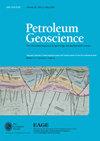Stratigraphic controls on hydrocarbon recovery in clastic reservoirs of the Norwegian Continental Shelf
IF 1.9
4区 地球科学
Q3 GEOSCIENCES, MULTIDISCIPLINARY
引用次数: 6
Abstract
A number of geological and engineering parameters influence and control the performance and ultimate recovery from an oil reservoir. These are commonly interlinked and the relative importance of each can be difficult to unravel. These variables include geological parameters such as depositional environment, which has long been considered to be a key factor influencing the production characteristics of fields. However, quantifying the importance of any single factor, such as depositional environment, is complicated by the impact of the other variables (geological and engineering) and their numerous interdependencies. The main aim of this study is to unravel the impact of the depositional environment and primary facies architecture on reservoir performance using an empirical study of oilfields from the Norwegian Continental Shelf. A database of 91 fields, with a total of 7.8 Bbbl (billion barrels) of oil in place, has been built. Within this a total of 93 clastic reservoirs were classified into three gross depositional environments: continental, paralic/shallow marine and deep marine. The reservoirs were further classified into eight depositional environments in order to provide further granularity and to capture their depositional complexities. A further 28 parameters which capture other aspects that also impact production behaviour, such as reservoir depth, fluid type and structural complexity, were recorded for each reservoir. Principal component analysis (PCA) was utilized to explore the importance of sedimentological-dependent variables in the dataset, and to determine the parameters that have the strongest influence on the overall variability of the dataset. PCA revealed that parameters associated with field size and depth of burial had the most influence on recovery factor. Gross depositional environment and other stratigraphic-dependent parameters were the most significant geological factors. Fluid properties, such as API gravity and average gas/oil ratio, were unexpectedly among the less important parameters.挪威大陆架碎屑岩储层油气回收的地层控制
许多地质和工程参数影响和控制油藏的性能和最终采收率。这些通常是相互关联的,每一个的相对重要性可能很难解开。这些变量包括沉积环境等地质参数,长期以来,沉积环境一直被认为是影响油田生产特征的关键因素。然而,由于其他变量(地质和工程)及其众多相互依存关系的影响,量化任何单一因素(如沉积环境)的重要性变得复杂。本研究的主要目的是通过对挪威大陆架油田的实证研究,揭示沉积环境和原始相结构对储层性能的影响。一个由91个字段组成的数据库,共7.8个字段 已经建造了数十亿桶的石油。其中,共有93个碎屑岩储层被划分为三个总沉积环境:大陆、近海/浅海和深海。储层进一步分为八种沉积环境,以提供进一步的粒度并捕捉其沉积复杂性。为每个储层记录了另外28个参数,这些参数捕捉了也影响生产行为的其他方面,如储层深度、流体类型和结构复杂性。主成分分析(PCA)用于探索数据集中沉积学因变量的重要性,并确定对数据集整体可变性影响最大的参数。主成分分析表明,与油田规模和埋藏深度相关的参数对采收率的影响最大。总沉积环境和其他地层相关参数是最重要的地质因素。流体性质,如API重力和平均气油比,出人意料地成为不太重要的参数。
本文章由计算机程序翻译,如有差异,请以英文原文为准。
求助全文
约1分钟内获得全文
求助全文
来源期刊

Petroleum Geoscience
地学-地球科学综合
CiteScore
4.80
自引率
11.80%
发文量
28
审稿时长
>12 weeks
期刊介绍:
Petroleum Geoscience is the international journal of geoenergy and applied earth science, and is co-owned by the Geological Society of London and the European Association of Geoscientists and Engineers (EAGE).
Petroleum Geoscience transcends disciplinary boundaries and publishes a balanced mix of articles covering exploration, exploitation, appraisal, development and enhancement of sub-surface hydrocarbon resources and carbon repositories. The integration of disciplines in an applied context, whether for fluid production, carbon storage or related geoenergy applications, is a particular strength of the journal. Articles on enhancing exploration efficiency, lowering technological and environmental risk, and improving hydrocarbon recovery communicate the latest developments in sub-surface geoscience to a wide readership.
Petroleum Geoscience provides a multidisciplinary forum for those engaged in the science and technology of the rock-related sub-surface disciplines. The journal reaches some 8000 individual subscribers, and a further 1100 institutional subscriptions provide global access to readers including geologists, geophysicists, petroleum and reservoir engineers, petrophysicists and geochemists in both academia and industry. The journal aims to share knowledge of reservoir geoscience and to reflect the international nature of its development.
 求助内容:
求助内容: 应助结果提醒方式:
应助结果提醒方式:


